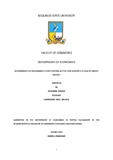Please use this identifier to cite or link to this item:
https://cris.library.msu.ac.zw//handle/11408/2557| Title: | Determinants of willingness to pay for aids levy by civil servants: a case of Gweru district | Authors: | Kahombe, Tanaka | Keywords: | Civil servants | Issue Date: | 2014 | Publisher: | Midlands State University | Abstract: | The primary objective of this study was to establish the determinants of willingness to pay for AIDS levy by civil servants in Gweru District. A sample of 328 civil servants in Gweru was surveyed by the researcher using two-stage cluster sampling technique. Civil servants were first grouped according to their Ministries representing clusters and then a simple random sampling was employed from each cluster to collect data. The researcher employed the theory of contingency valuation method because it is a straight forward technique used by many researchers to elicit willingness to pay. The contingent valuation method also ascertain key factors influencing an individual willingness to pay hence found suitable for establishing the determinants of willingness to pay for AIDS levy by civil servants in Gweru. Primary data collected through the use of questionnaires was regressed using the probit model regression method. The results showed that civil servants were willing to pay on average US $7.67of their monthly income that is 1.8% according to appendix 8 which is less than 3% they are currently paying. From the regression results income, gender, level of education, number of people employed in a household all were statistically positive significant determinants and gender was a negative significant determinant of willingness to pay for AIDS levy by civil servants in Gweru District. From the findings there is need for the government to reduce the AIDS levy percentage downwards to improve the welfare of those who earn an income below the poverty datum line, those with low level of education and households with only one employed member mostly older men. Future studies should consider the formally employed citizens in the private sector as they were left out in this study, and adopt the significant new variable number of people employed in a household used in this study as a determinant of willingness to pay. | URI: | http://hdl.handle.net/11408/2557 |
| Appears in Collections: | Bachelor Of Commerce Economics Honours Degree |
Files in This Item:
| File | Description | Size | Format | |
|---|---|---|---|---|
| R112146Z.pdf | Full Text | 1.29 MB | Adobe PDF |  View/Open |
Page view(s)
86
checked on Dec 22, 2024
Download(s)
20
checked on Dec 22, 2024
Google ScholarTM
Check
Items in MSUIR are protected by copyright, with all rights reserved, unless otherwise indicated.



